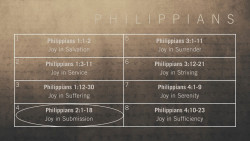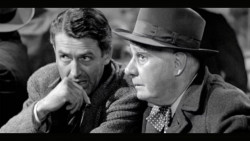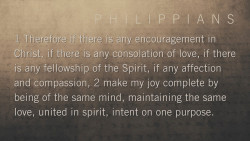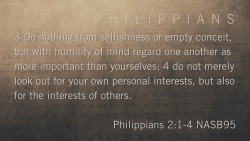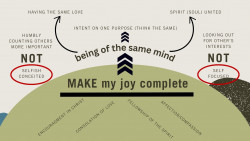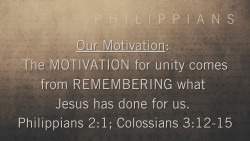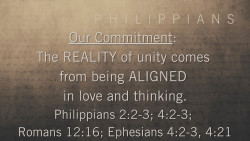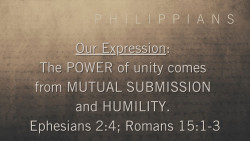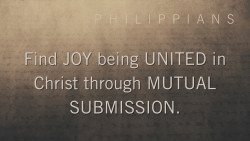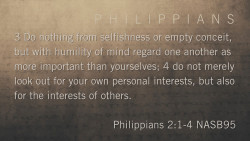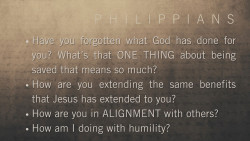Philippians - Part 4
Sunday message.
Unpack the rich teachings of Paul in Philippians 2 and discover how true joy and purpose is found, not in isolation, but in living a life of selfless love and service.
MP3 Audio
MP3 Transcript
View an A.I. generated full transcript of the audio.
Good morning, everybody. If you have a Bible with you, I hope you do, or a device, I want you to go to Philippians chapter 2. In the last few weeks, we've been having. I've had a chart in your guide that kind of talked about where we were going with this series. And this week, we start the fourth week of the study in Philippians.
But I want to tell you that last week, after going through the text, I went. You know, I'd really like to pump the brakes a little bit. And so if you see on the screen where it has Philippians 2:1:18 circled, going to break that up into three messages. All right. And then the next week for Philippians, really, for weeks five and six, we're going to break that one up into about three weeks.
So if you've been following along, you've got one of the study guides or you're using your own Bible, I just wanted you to know we're going to slow down a little bit. God, there's so many rich words in this book. You know, we've been talking about Bible study methods and different things that you can do. Well, today, one of the things I want to funnel into is. And I hate.
All right, y'all ready? I'm going to geek twice today. This is my first geek out moment. But you remember in school when you would sit down, you were taking basic grammar, that the teacher would say, all right, I want you to identify the subject and the predicate of a sentence. I saw somebody start drooling at that moment.
But your teacher, when I was in school, they would have us underline the subject with one line and the predicate or the verb with how many lines? Two. Yeah. So, guys, listen. They didn't teach you that just to speak and to have you draw.
They wanted you to use that. And when you're reading a text, one of the greatest practices you can do is finding a way to mark things, especially verbs. And when you're reading something and you come along, you usually have in a paragraph, a primary predicate, a primary verb. Now, you also have gerunds and participles and infinitives. Now you really are drooling.
A gerund is a verb ending in ing that acts like a noun. Like skiing is a fun sport. I just used skiing as a noun. Okay. Or a participle would be similar.
You could use the present or the past participle ending in ing or ed. Usually it's used as to describe something. I am going to the store running. As I go running describes How? I'm getting there.
Okay. And then an infinitive is a verb placed behind the word to, T, O. And it can act in certain ways as well, adverbially. Or it can act as a subject as well. It's like I could say, I like to fish.
Fish. To fish becomes the direct object of that verb. Now, I really did break your brain, but I want you, as you are studying Scripture, to pay attention to verbs. Greek language loves participles. In fact, if you were to read Ephesians, Chapter one, there's only one primary verb in the bulk of that chapter, and everything else is participles pointing back to that one phrase.
Well, guess what? This week, it's no different. We're going to be looking at a passage today, and there is only one primary verb, and I can't wait to break that down for you in just a few minutes. So if you've got your place, let me share something with you. I have a confession to make.
I broke tradition. I mean, I broke it bad. At Christmas, usually when it's time to decorate, my wife begins to ask, watch the Christmas movie. To which I really default to the Grinch.
No, I don't. Typically, for the last few years, we have watched It's a Wonderful Life. Yes, A lot of y'all just amen on that one, because I also can do a good Jimmy Stewart. And I mean, we watch that movie, it just breaks us out of that shell. In fact, this movie is getting old.
It's getting old. It's still in black and white. But anybody in the room that has never watched this movie, just be confessional. I disown you. No, I'm just kidding.
That is your homework. I know Christmas is over, but I want you to go watch it, because. Can I be really authentic and transparent with you? I have found myself in my life feeling like George Bailey sometimes, that everyone else would be better off if I wasn't around. Now, wait a minute.
I'm not saying that. Feel sorry for me. Just being authentic. Because some of you in this room feel the same way you do, and you do, and you do for others, with nothing ever reciprocating. And you just kind of come to this conclusion.
Well, you know what? The world would just be better off if I wasn't here. That's some dangerous ground. First of all, thinking. But that's exactly the climax of this story as George Bailey has lived his life.
When he was 12, he rescued his little brother from drowning in a frozen river. His brother grows up to go off to college. On his brother's dime. His brother really wanted to go to college, but things didn't quite work out for George. And so he gives his brother Harry money to go off to college.
And then when World War II begins, Harry gets drafted and Harry becomes a war hero. He's coming home on Christmas Eve to be celebrated for receiving a Medal of Honor, for stopping a kamikaze plane from flying into a boat carrying troops. But that's not the only time that George kind of set his own self on the shelf, when right after his accident, when he rescued his brother, it gave him an infection in his ear, and he loses his hearing in that ear. And so just a little time after that, he works for Mr. Gower, who is the town pharmacist.
Mr. Gower gets a letter that no person ever wants to get, that his son had been killed in the war, World War I. And Mr. Gower is drunk, and George is paying attention even as a preteen young teenager, that Mr. Gower had put the wrong medicine in the wrong vial.
And he's trying to tell Mr. Gower, and Mr. Gower strikes him in the same ear that's infected. And he starts to pour blood, and he's like, Mr. Gower, you just don't know what you're doing.
You don't know what you're doing. And he stops him from basically giving medicine that would have killed somebody. And then time passes, and as he grows older, like I said, he ends up giving his money for college tuition to his brother because his dad dies. And he ends up taking over the loan and billing. I mean, excuse me, the loan that his family business owned and.
Or his family owned. And he gives up his dreams of ever going off and going away, but because he takes over the building and loans, he ends up building this place called Bailey park, which is where people could go and get affordable living in conditions and better homes. Because under Mr. Potter, who was the bank owner, who was on the board for the Building and Loan, he wanted to take advantage of people and keep people in deep poverty and dependent on the bank. And it comes to a climax on that Christmas Eve when Harry's coming into town that George's uncle misplaces $8,000.
In fact, Mr. Potter saw it and he kept it to himself. But this is Mr. Potter's chance. I'm going to get that George Bailey.
I'm going to shut down that building in loan. I'm going to stick it to him. And George runs and he comes to this conclusion. If I'd have never lived, everyone else would have been better off. That's a sad position to be in, is it not?
And some of you may be thinking sometimes like, you know what, I give and I give and I give and I give, but for what benefit? Or maybe you're in this room and you're actually on the opposite end of that. And if you would be honest, you really never think about anyone else except yourself. Now I'm just being frank. There's a spectrum there from pride to humility.
And it's tough. It's tough when we want to live lives that matter. We live in a culture where that promotes individualism and isolationism. We live where there's economic structures that promote winners and losers. Our flesh usually drives us to take care of our needs first.
Bigger, faster, stronger, richer. Is that not the American way? But sometimes it's at the expense of someone else. In fact, if I could be frank, there's not a lot of George Bailey's in this world who's willing to give up everything they dreamed of so that somebody else could get a little further along. We have a family member that once told the story that after he came home from service, he had this dream and ambition to become a forestry ranger and he gave up everything so that he could take care of his family's farm.
You and I sit in here today and we're wondering, you know what, what am I living for? What is the purpose of my life? Many, many years ago, I guess everything's old today. Back in 1932, the New York Times wrote an article where they were reporting about the necessary qualifications to live a successful life in the world today. Now do a little math.
1932 was a few minutes ago, but they interviewed five men. One of those was John Dewey, who greatly influenced the education system that we have today. Edward Robinson, who was an American poet, and three time Pulitzer Prize winner Aldous Huxley, who wrote the novel Brave New World that spoke of visions of a future utopia. And then finally, at the time, Supreme Court Justice Louis Brandet. I think I'm saying that right.
Forgive me if I'm not speaking French. I take Italian, you know what I'm saying? But he greatly influenced in his time the creation of the Federal Reserve and the Federal Trade Commission. They left some marks on this world, but it was the fifth man who didn't talk about business and acceleration and getting ahead in life. He said this.
Only a life lived for others is a life worth. Only a life lived for others is a life worthwhile. This man, you will know him when I start to talk about him. I can empathize with him because I went to get my hair cut this week, and as she combed my hair, all it sounded like was snap, crackle and pop. My hair literally was standing out like this, much like this man who really is a hero of mine.
His name was Albert Einstein. See, we know Albert Einstein probably more for the science of his life, but this man cared about other people. Listen to what he said again. Only a life lived for others is a life worthwhile. Later, in 1940, in a magazine called Science, he would say this.
Nothing truly valuable can be achieved except by. By the unselfish cooperation of many individuals. You know why you can't find and fulfill the purpose God has for your life? Because you don't know what that purpose is because you're living in isolation. I'll get it done.
I'll take care of myself. I don't need anybody else. But I have some bad news for that. God does not want you living in a little bubble. God doesn't want you living isolated from other people.
The Son of God left eternity and came and put on flesh so that he could be with you and me, so that he could sacrifice himself for you and for me, so that he could come and bring the plan of salvation to this world. And that little bubble sometimes that we like to live in, either because we're insecure or because maybe we just don't like people. God has a way of taking a big old needle and he'll pop that bubble every time. Come on, you guys know that sometimes we're sitting there saying, oh, God, please give me patience and humility. And then he puts somebody in your life to test that, does he not?
He does sometimes because he wants you to be stretched in your ability to represent Jesus and love others.
Today, when we read this passage, when we read this part of Philippians, of the letter to the Philippians, Paul has talked to them about a lot of things, but basically it's summed up in three statements. I'm in prison. Jesus put me here. It's for your benefit. Right?
And I believe he's going to let me out. So we need to be on the same page. We need to be preaching the purity of the gospel. We need to be walking in a worthy manner of the Gospel of Jesus Christ. Why?
Because together, unified, one team, together on the same purpose, is the only way that the Gospel is going to go out. That what Paul's doing in prison, living, living and doing what he felt like God called him to the Gospel. Was connected to what the Philippians were doing as they were supporting him, and he was supporting them. And even 2,000 years later, we are still in the same mission with Paul and the Philippians and the Corinthians and those in Ephesus. We are still connected with the mission that Peter and James and John and all the disciples and the apostles and the martyrs of all time in churches and here and there have been doing for over 2000 years, which is taking the name of Jesus Christ to the ends of the earth.
And if you think for one moment that that's going to be accomplished by yourself, we're a fool because we can't. God planned it, that we would be in the body together. He called us to do this together, to live worthy, the gospel, to stand firm in one faith, courageous against opposition, standing in that gracious gift that he has given to us, not just to believe, but also to suffer for his name, that we would share and identify and grab hold of the same suffering that Paul was living. To live a life that mattered. And you cannot live a life that matters if it's not affecting other people.
And we can't affect other people alone. So would you stand with me as we read four verses? Like I said, we're pumping the brakes, we're slowing down a little bit. And what I want you to notice here are three things. You already have them in your study guide, but verse number one is going to speak to our motivation.
Motivation. Like, what in the world would motivate me to want to be unified in purpose and mission? Then he's going to give the command.
All of this passage kind of wraps around, and that is the command that we need to be unified and how that unity works. But then in verses three through four, he gives us a contrast. He says, do this, not this. In verse four, he says, do this, not this. So as we read, I want you to pay attention to that.
Therefore, if there is any encouragement in Christ, if there is any consolation of love, if there is any fellowship of the Spirit, if there's any affection moved in my gut, if there's any compassion, mercy, make my joy complete. That's the primary verb. Make my joy complete. How? By being of the same mind.
That verb connects back to make. Okay, we're going to talk about that in a minute. Maintaining the same love, unified in spirit, intent on one purpose. If you have a King James, he says, in one mind, in one accord, doing nothing out of selfishness or empty conceit, but with humility of mind regarding one another as more Important than yourself. Oh, man, you're getting in my stuff now.
Not merely looking out for our own personal interests, but also to the interests of others. You want to find the key to finding joy in your Christian walk. You tired of living in a depressed state and feeling like things are hopeless and helpless? Maybe the call for you today is to take your eyes off of you and where you are and put them on somebody else. Father, as we dig into this passage, would you speak boldly and loudly, not through my words, but through your word and your word alone.
In Jesus name, amen. So again, I want you to look at verse number two, because I want to point out that that is the primary verb of this sentence. Make my joy complete. In fact, I've got a graphic that took me a little bit of time to make, so I want to put it up there. I did.
It took me a little bit of time here. I love canva, by the way. College students said amen. We had PowerPoint. And PowerPoint's not my friend.
But I want you to notice this is how this breaks down. If you'll look at the top in the green on the bottom, there are four. Encouragement in Christ, consolation of love, fellowship of the spirit, affection and compassion. Those are the four pillars on which this idea of making my joy complete rests. That is the foundation.
In fact, when you look at verse number one, the word is is not in the original language. It says, if encouragement, if consolation, if fellowship, if affection and compassion, if these things exist, if this reality is there, then upon that you can begin to build this idea of making my joy which the my there is. Paul. But here's the thing. The my can be yours too.
When I can reflect and recall what it is that Jesus has done in my life. The word encouragement is parakaleo is the word we get. Paraclete, helper, Holy Spirit, come alongside, gifting me, lifting me, encouraging me, guiding me, direct me. If there's any parakaleo, if there is any encouragement in Christ. Are you encouraged in Christ today?
Do you remember what it is he's done for you? Do you have an image and a vision of an old rugged cross? If I can be just a little bit preachery for a moment of Jesus pouring out his blood so that you could live? Do you have an image of a Jesus beating to a pulp with a crown of thorns on his head doing that for you folks, that is encouragement. The only life that we have to live, we have in Christ is in fact.
Go back. Go back and chart it. Take your notebook. The word Jesus And Christ or Jesus or Christ happens 18 times in the first chapter. Christ is the center.
That's not even counting the pronouns. That's almost one time. Every verse there's 30 verses. That's almost 20. Uses two out of three verses, names Jesus if there's any encouragement.
I mean, we can't look at what Paul's going through and not draw the conclusion. Jesus was the center of his life and that's where he got his encouragement. Consolation of love. Remember what he prayed? He said, I pray that you would abound more and more in agape, in love.
And folks, love that is not expressed cankers and begins to smell because you can't keep it inside. If love is inside of you, it demands expression. Paul is saying, I love you and I believe you love me. And I find consoling encouragement in that. And then he says, fellowship of the spirit.
Fellowship of the spirit. Koinonia. We talked about it in chapter one when he talked about, you are partners with me in the gospel. You are partakers with me in this journey. There was this deep unification, but what unified to the Holy Spirit.
Because when you get saved, the Spirit lives inside of you. And now that spirit should be knitting me with one another. And the only thing keeping me from being knit to somebody else is when in my pride and lack of humility I learned to live in the grace of God with other people. So that when something comes up in my life, I don't let it sit and stew. I do.
I give the forgiveness that's necessary. I confess my sin to somebody else. When I offend them, I do that. And then if it's truly the grace and the mercy of God, it's in the past. That's where he talks about there's affection, affection.
That gut moving. Same thing that moved Jesus when he looked at the sheep that were scattered because they had no shepherd. He was moved in his gut. When was the last time that you saw someone in need, someone hurting, someone destitute, someone crying, someone had some brokenness in their life and you were moved with compassion, moved with mercy? No, this is how it usually happens.
We go and find that phone and call up and say, I don't know if you've heard yet, sister. So and so's son, he's running around on his wife. I think we need to pray for them. No, you're not. You're gossiping is what you're doing.
What if you instead hung that phone up and called the woman whose son and daughter were having problems and said, hey, listen, I Have no clue what's going on. I don't know. I have all the details. What can I do for you? This has to be tearing you up on the inside.
That's compassion, that's mercy. Being willing to look and see what's going on in someone else's life. And that is what Jesus has done for you. He wants a relationship with you when you're saved. He puts his spirit inside of you.
God is love. So now you're filled with the thing that would drive you to love one another. And that should move you in your gut, move you to want to extend mercy. And in that verse number two, my joy is complete.
My joy is complete. And Paul goes on to clarify, like what. What is it? What is it that's lacking in his life in, in the church that would not let him have full joy? Well, go back for just a minute up to, to.
To last week when we were talking about he's in prison. And in verse 15 he says something to be sure of preaching Christ from envy and strife, thinking to cause me harm. But do you remember what he said? He said, I don't care if they're preaching out of pretense or they're preaching out of truth, Christ is being preached. And in this I rejoice.
He didn't care. He just wanted to make sure Christ was being preached. But he knew. He knew that there's something going on in the church. He knew that there were men, possibly women, that were abusing the church for their own benefit.
Envy and strife. In fact, if you turn over to chapter four, we'll be there in a few weeks. But he says in verse number two, I urge Euodia and Syntyche to live in harmony in the Lord. That word harmony is like minded. In fact, if you want to mark something in your notes, he's going to use the word think alike three times in five verses.
In fact, that's what he says. If we go back, mark real quick to that image, have this joy. How? By being like minded. Have this joy by being of the same mind.
You know, if we were to watch football tonight and the coach decided to send all his receivers out on the field at one time, 11 receivers.
In other words, everything is uniform. Everyone's a receiver, everybody's got the same number. And they go out on the field, you know what kind of chaos that would bring? Who's going to throw the ball? Who's going to block for the quarterback?
There is no quarterback. Like, how would you even line up? Can you imagine the lineup you Know, like, there's nobody up on the line. You got five people over here and six people out here just ready to run. Who's going to snap the ball.
Being united means that everybody on that field has the same goal, and that's to get that football across that finish line. Being unified means I accept the differences. It doesn't mean that we won't disagree, but it means we're on the same page with the same intention, headed in the same direction. That's what that means. And so he goes on to say what this looks like.
In fact, he gave you four reasons. Now he's going to give you four ways that looks. In fact, if we go back to that image one more time, just leave it up till I get to my point, if you don't mind. He says, having the same love. Having the same love.
Listen, I know everybody in this room, you were raised a different way. Some of you were raised in loving households, and some of you were not. Some of that love was very abusive and selfish. Some of that was nurturing. But when he says having the same love, number one, the source of that love is Christ, and the sharing of that love is among one another.
He says, united in spirit, literally soul. He just said, if there's any fellowship of the spirit, now he's saying, share it down to the depth of who you are, your soul. And. And how does that look? Intent on one purpose.
Thinking the same. Those verbs, those participles are the same. Bless you. Being of the same mind, that's what completes the joy. But one of those ways is being committed, to be unified in our thinking.
Have you ever had the opportunity to be a part of a project or something where. Where no one knows where you're going, what you're doing, the direction that it's headed, and how frustrating that can be? We did it a few weeks ago with a little. A little thing that we do with this leadership forum where we were supposed to go find a little bag hidden in the woods. And some of us guys.
I let the teenage boys influence me a little stronger than I should have. Clayton. And we just took off and we just started looking, didn't we? Yeah. He's smiling now.
He knows what I'm talking about. And we were kind of scattered out, and when we were done, they said, you know, if we'd have stayed together as a team, we probably would have found it quicker because the team that did, did. They found it quicker because they were of the same mind. And what does that look like? Verse number three, Humbly counting Others more important.
When you sit down and you're doing your checkbook, you look and see what matters most in your life. You start counting the cost, right? It's no different. You start looking out at the things going on around you in humility going, man, that person needs help, and that person needs help. Usually.
Sometimes what we do is we go, well, you know what? They shouldn't have made a bad decision. They're getting what they deserve. That's not humility. That's not compassion.
Thinking others is more important. Counting them, like, you're counting up, like, look, dude, they've lost this. They've had this happen to them. And maybe they just need somebody to step into their life. Not selfishly, not conceited, not trying to make yourself look good, not trying to make yourself top of the pack.
See, when you and I humble ourselves to help somebody else, we're not reaching down from a perch going, hey, hey, look, if you want to be good, come up here with me. What humility does is this. Humility comes off my perch, counting my cost, counting myself is less important. And I get down in the muck, in the mire, and I grabbed them by the bottom of the foot and I helped them get up. It's a different position, is it not?
That's why when we pray, yeah, I can pray standing with my eyes closed. But how much different is it when I lay myself prostrate before the Lord, saying, God, I'm a worm and a wretch before you, but I'm saved. And by your grace, I have encouragement, I have consolation, I have fellowship. Lord, I know that that in your gut. Jesus said himself, when he looked at the sheep, the people, they were like sheep without shepherds.
And it moved him in his gut. And what would that cause us to do? To look for others interest, not only for our own. That word literally means to be on guard. Like, if you go down to South Georgia and you see those fire towers, those big old tall towers erected that people can climb up, because down there it's flat.
It's not like it is up here in the hills. And they can stand in that tower and they can see fires happening down miles and miles down the way where they can send responders to it. We've been called to look out. We've been called to look at. You know, why they call it Lookout Mountain up in Chattanooga in the Civil War, that was a very important place because they were looking out.
But let me be honest with you. Some of us in this room, we've allowed our own cares and concerns to so envelop us that we can't see over the top of the trees, that if somebody was 10ft from us burning and dying, we'd never know it. Because here's the truth. I have to take this and make it a conviction and a commitment in my life that I'm going to look outside of who I am and look at what's going on in. In other people's lives.
So for those of you that like those blanks, let's summarize all that I just said, bring it to some application. Our motivation. Point number one is that our motivation for unity must come from remembering what Jesus Christ has done for us. Have you gotten over being saved? I hope you haven't.
If you have, you need to be reminded you are a wretched sinner, separated from God by your sin. And there wasn't one good thing you could do and you didn't go to the Lord and say, God, I'm trying to live better. Could you love me a little bit? No. You went to God and you dropped to your knees, God, have mercy on me.
Have mercy. And when I recall that Jesus gave me mercy, oh, the freedom and the joy that can come when I can freely give that mercy to somebody else. But I'm telling you, you'll never do it. Perched on a high heel in our pride, in our arrogance, thinking, oh, I can help these people because they're scum. No, I need to get down in the dirt with anyone and be willing to get them up.
That's what he did for us. You say, you know what? It's hard for me to forgive others. No, it's not really. When you understand what's been forgiven of you.
Are you hearing me? If you're holding on to unforgiveness, if you're holding on to bitterness, I'm going to tell you the best picture you can ever see is a picture of the cross, because that's how dirty your sin was. And Jesus did that for you and, and he's calling you to do it for others. Second point here, that point of commitment, that command, the reality of unity, comes from being aligned in love and thinking again. Einstein said, nothing truly valuable can be achieved except by the unselfish cooperation of many individuals.
Let me repeat the second verse in. In a different word order you all, or we're in the south, y'all make my joy complete. Fulfill it. To my joy. He puts my in front of the word joy.
So he's emphasizing, this is my joy. I mean, even Jesus Himself in John chapter 15, as he's talking about, I want you to bear fruit. Abide in me as I abide in you. I and the Father am one. And.
And he says, I want you to bear this fruit. I want you to find my joy. Because my joy, my complete joy is being poured into you. And is it being poured into you? You can pour it into others when we're on the same page in our thinking and in our affection.
Listen, I know there's people that are hard to love, but that does not give you the excuse to come up for with excuses to not give that love. In fact, I'll argue this. You want to measure your love, love the unlovable. When you love those who already love you, there's no benefit of that. But when you love those who don't love you, what's the measurement?
You measure it better against those with whom you need to love. Third point is this, I'm turning fast. The power of unity comes from mutual submission and humility. The power of unity comes from mutual submission and humility. And we don't like that word, submission.
But let me remind you, in Ephesians 5, 21, one of the four fruits of the Spirit that he's talked about there don't be drunk with wine, which leads to dissipation, but be filled with the spirit. The last one was to be mutually submitted to one another. I would say in this room, if you're saying, you know what, I know I'm not going to submit to somebody else, I would then argue to say, well, I'll question whether the Holy Spirit of God's living in your life.
You want to find joy. Stop fighting your brother, stop fighting your sister. Lay down your arms and find the freedom in letting people go go of their sins. And when we do that, what the world sees is a bunch of happy, jolly people.
What do you think would convince the world of the goodness of the gospel? More a bunch of stick in the muds who are grouchy all the time or a bunch of spirit filled, happy, joyful people. I'm not saying bad stuff ain't gonna happen in your life. But he's given us this immense well of joy that comes from Jesus himself that he's willing to just give to us freely. I remember a story about a man who was struggling with depression and he went to a psychologist and the psychologist said, you know what?
I'm gonna tell you what to do. Nahum thought he was gonna give him a magic pill that would help take the depression away. He Thought he was going to do something just really weird. And he said, no, here's what I want you to do. I want you to go to McDonald's.
I don't know why it was McDonald's. I guess golden arches make everybody smile, right? Unless they cook your patty with wax paper on it. That's another story for another day. He goes and he gets a Happy Meal.
And he said, I want you to take it down to the train track and I want you to find a homeless person and give it to them. And then the next day I want you to do it again and again and again. You know what happened to that man? The more he began to look at the destitution of those who are around him, it began to take his eyes off of his own situation. And you know what he found?
He found joy. We need to climb up in those towers so that we can look out and want and want to look out. Each of us should not look only to our own interest. I mean, doesn't say you're denying everything about yourself, but also to the interest of others. That we don't do it to make ourself feel better.
We don't do it to make ourself look better. We're doing it out of the love and compassion and the connection that we have with Jesus Christ. You know what makes it even better? When we do it together. How many of my golf players ever play a round of golf by yourself?
How many of my fishermen ever go and fish by yourself? How much better is it when you got somebody else with you? When I played golf, I'm terrible. I'm just honest with you. I'm terrible.
So I got to where I'd stick Bubba teeth in this wig in my bag. So when I started playing bad, I'd put that wig on and put those Bubba teeth in and start acting like a fool. And then I started playing better because I wasn't so focused on me and whether I was pressing my friends.
We need each other. See, we find joy being united in Christ through mutual submission. Each of those things. When you look back at verse number one and then you compare it to verse number two, everything has a contrast. That where there's the need for encouragement in Christ, we're like minded.
When there's consolation of love, then you know what I need to do. We need to maintain the same love. That when I need fellowship, I need to be united in spirit. And remember I'm united in spirit. And then when I need affection and compassion, I remember that he's calling Me to feel the same as somebody else does, to think the same as somebody else does.
And my question to us is this. Today, I wonder, have we forgotten what God has done for us? You see, in the movie, George Bailey gets what he asks for. Clarence shows up and grants him his wish. And he goes back to an alternate Bedford Falls.
By this Bedford Falls, now it's called Pottersville, because Mr. Potter did take over the whole town. He finds where Bailey park was, is now a cemetery. And he stumbles in and he finds Harry's tombstone because remember, he wasn't there. So now Harry didn't live.
He drowned. So his parents are childless.
That troop, that boat of troops, the kamikaze flight, ended up doing its damage. Mr. Gower ended up going to prison for poisoning that patient. And now no one will use him. He's destitute, broke and poor.
See, I want to live a life that makes a difference, but I can't live a life that makes a difference if I'm going to live it in a bubble. Some of us today, we need God to come and take that needle and pop that bubble that we're living in. In fact, here's what I want us to do. Josiah's going to come and lead us in a verse and chorus, however long it takes. And this altar is open.
Maybe you need to come and. And talk to the Lord about that. You have forgotten what he's done for you. Forget not his benefits, as David wrote in Psalm 103. But then how are you extending that to others?
And what does it look like if we could be aligned more and more in this next week, we're going to talk about what that looks like in the model of Jesus. But today, here's what I'm going to challenge us to do while we're singing. It may not be the altar that we need to come to. It may be across the aisle. Maybe you've been harboring unforgiveness towards somebody for so long, but today the Lord is saying, you know what?
I need you to do business. And it may not be in this room. Maybe you need to do it privately, one on one. But what if you made the commitments this week? I'm going to call up so and so and I want to get things right with them.
Or maybe it's the reverse of that. Maybe you know, maybe you know that you've done something to somebody else and you need to go and say, I'm sorry. How can we make this right? How can we get back on the same page, same mind, same accord. How can we do that?
Because here's the truth. I'm going to close with this statement. If you're not actively fighting for unity, you may be inactively fighting against it if it's not a value. If unity is not a value in your life in the church, either in your passivity or your aggression, you're going to be fighting for disunity. And if we want to be a church that's leading the broken to hope in Christ, I guarantee you God will never send a broken person into a room where they're not going to be received with grace and mercy.
And if we can't extend it to ourselves, John 13:34 through 35 says, Love one another. Love one another. Love one another, just like I loved you, love one another. We have to have it right between each other before we can ever take it out of this, out of this church, into a lost community. Father, speak to us.
I know in the midst of words and preaching, God, it does seem foolish, but, Lord, you have something to say to us. And some of us in this room, we have. We've wrestled with some broken relationships for far too long. Lord, how I know this is hard. There may be some of us in this room say, hey, I can't go to that person because they're not going to receive it.
But Lord, maybe you can soften the heart to make that happen. Lord, let us trust in you to lead us to do what you're calling us to do, and we'll leave you with the results. Lord, we love you. In Jesus name, amen.
More from the Philippians Series
- Philippians - Part 1 - Joy in Support ... (January 5, 2025)
- Philippians - Part 2 - Joy in Serving ... (January 12, 2025)
- Philippians - Part 3 - Joy in Suffering ... (January 19, 2025)
- Philippians - Part 5 - Joy in Submission: The Example of Christ ... (February 2, 2025)
- Philippians - Part 6 - Joy in Submission: The Work of Christ ... (February 9, 2025)
- Philippians - Part 7 - Joy in Surrender: Giving Up ... (February 16, 2025)
- Philippians - Part 8 - Rejoice in Pressing On ... (February 23, 2025)
- Philippians - Part 9 - Joy in Surrender: What's to Come ... (March 2, 2025)
- Philippians - Part 10 - Joy in Serenity ... (March 9, 2025)
- Philippians - Part 11 - Joy in Sufficiency ... (March 16, 2025)
Weekly Bulletin


